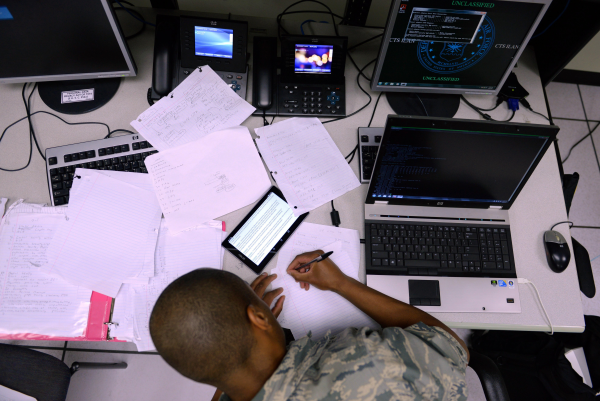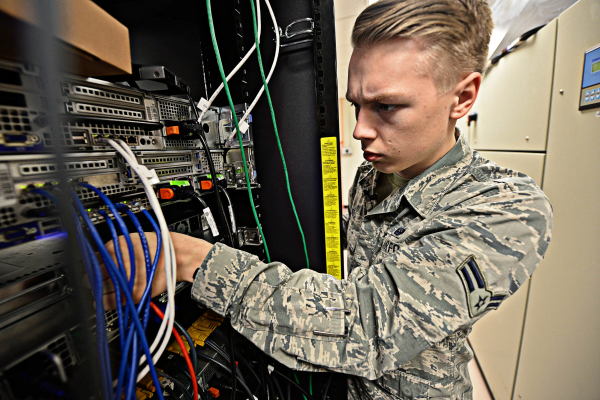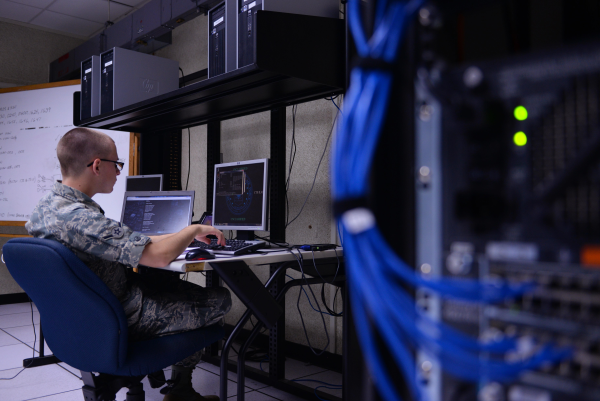Cyber Transport Systems specialists have a job that is like an Informational Technology (IT) technician.
Personnel in this field plan, deploy, and manage data, video, and voice networks and IP systems.
Also, designing, configuring, and operating networks, as well as defending those networks, is an essential skill.
This field provides specialists with an in-depth knowledge of information and computer systems analysis, where they can support mission-critical software and systems.
Jump To A Section
Education, Training, and Qualifications
What does an Air Force Cyber Transport Systems Specialist do?
How much does an Air Force Cyber Transport Systems Specialist Make?
Education, Training, and Qualifications

In order to become a Cyber Transport Systems specialist, several requirements are necessary.
Specifically, you’ll need to pass a background check, score high on the ASVAB test, and have a minimum of a high school diploma or GED equivalent.
All of the requirements are discussed in detail below.
Education
The minimum education standards to qualify for this career in the United States Air Force is a high school diploma or a GED.
The aptitude test (ASVAB) should show an overall knowledge in the area of electronics.
In order the qualify for entry into this AFSC, you’ll need to score a minimum of 60 on the Electrical portion of the ASVAB test.
Related Article: ASVAB Scores For All 130+ Air Force Jobs
Qualifications
Other qualifications include having a normal color vision and a state driver’s license.
You should have experience with data, voice, and video network infrastructure, as well as have a working knowledge of network principles.
Furthermore, it is essential to know circuit diagram interpretation, specialty tools, and copper and fiber optics.
This specialty requires maintaining an Information Assurance Technical Level II certification.
Lastly, you will need a Single Scope Background Investigation (SSBI) completed to qualify for this career.
Training

After basic training, the technical training for this specialty takes place at Keesler Air Force Base in Mississippi, and the training is 136 days in length.
After this initial training, your training continues throughout your career and as you earn rank.
Once you report to your permanent duty assignment, you will begin your 5-level technician training.
Once this level of technical training is accomplished, you can perform your job without nearly as much supervision.
With rank comes a higher level of training.
For instance, at the rank of staff sergeant, you will begin level 7 training, which includes supervisory tasks.
At the rank of senior master sergeant, the title of this job changes to Cyber Operations Superintendent (AFSC 3D190).
Related Article – How Hard Is Air Force Basic Training?
What does an Air Force Cyber Transport Systems Specialist do?
Since we live in a world of cyber-attacks and cybersecurity, this specialty is even more critical now compared to when this career was first created.
Job Duties of Air Force 3D1X2
The job duties of this specialty are numerous as the responsibilities cover a vast infrastructure.
Video, Voice, and Data Systems
In this field, you will be responsible for providing video, voice, and data services. This responsibility means you will install, perform upgrades, and replace these systems as needed.
Expeditionary Communications Systems
These systems and services must be established during deployment to ensure units are connected. An Air Force Cyber Transport Systems specialist provides logistics support for continuous network operations, no matter where the mission takes you.
Network Systems Equipment
Maintaining and repairing network systems as well as using specialized tools and equipment to isolate malfunctions is a priority, as well.
Security
Compliance with security is essential, so a specialist is required to apply security programs to include physical and transmission security.
Project Implementation
A Cyber Transport Systems specialist will plan and implement projects to ensure the integrity of the system is maintained.
Base communication systems are also developed and planned in this specialty, as well as monitoring project milestones.
How much does an Air Force Cyber Transport Systems Specialist Make?
The Air Force pays according to rank and time in service.
In all cases, the benefits include a retirement package, tuition assistance, vacation pay, food, and housing considerations, and insurance benefits.
E-1 Airman Basic
For up to six years in service, the pay for an E-1 is $1,733.10
E-2 Airman
For up to six years in service, the compensation for an E-2 is $1,942.50
E-3 Airman First Class
Up until two years, the pay for an E-3 is $2,042.70.
At two years, the pay raises to $2,171.10.
For years three to six, the pay is $2,302.80.
E-4 Senior Airman
Up until two years, the pay for an E-4 is $2,262.80.
After the first two years, the pay changes regularly:
- At two years the pay raises to $2,378.40
- $2,507.10 at year three
- $2,634.60 at year four
- $2,746.50 at year six
E-5 Staff Sergeant
At entry-level, a Staff Sergeant can expect $2,467.50.
The pay changes regularly starting the second year:
- Year two – $2,634.00
- $2,761.20 at year three
- $2,891.40 at year four
- $3,094.50 at year six
E-6 Technical Sergeant
Technical Sergeants can expect an entry-level pay of $2,693.70 with pay advances starting the second year:
- $2,964.30 at year two
- $3,095.10 at year three
- $3,222.30 at year four
- $3,354.90 at year six
E-7 Master Sergeant
At entry-level, a Master Sergeant will make $3,114.30.
After two years, the pay increase is as follows:
-
- $3,399.00 at year two
- $3,529.50 at year three
- $3,701.40 at year four
- $3,836.10 at year six
Related Article: Air Force Ranks And Pay
Bonuses
Some Air Force jobs offer bonuses to enlisted members. The amounts are based on the job itself as well as the current needs of the Air Force.
During the job counseling that occurs at the Military Entrance Processing Station (MEPS), you will find out if you qualify for a career in Cyber Transport, and you will find out if that specialty has a current bonus.
If there is a bonus at that time, you will be authorized to receive the bonus if you meet the expectations of the contract.
Job Reviews

The overall reviews on Glassdoor for the Air Force as a whole show a high approval rating. In the case of the specialty US Air Force Cyber Transport, the results are similar. Current service members note the following:
- “Great way to gain experience in the network management world.”
- “Great work/life balance.”
- “Unmatched training, dynamic professional/ leadership development opportunity, and solid development for professional experience in dynamically challenging environments.”
One of the most noted cons was the lack of control for the location of deployment, which is a concern for any specialty.
Reviews on Indeed for Cyber transport have similar comments. Most notable are the mentions of job security and a transferable skill into the civilian world.
Civilian Job Opportunities
For those who are career planning and thinking about what skills transfer to civilian life after the military, Cyber Transport has plenty to offer.
In this field, the best-paying civilian jobs list having a bachelor’s degree as a requirement, and these jobs indicate the highest pay.
It is worth considering obtaining this degree before leaving the military for the best possible choices of opportunities as a civilian.
Related Article – 10 Best Air Force Jobs For Civilian Life
E3 Level
For those who are at the paygrade of E3, the notable available civilian jobs are a Computer Operator and Telecommunications Equipment Installer and Repairer.
The typical wage for a computer operator is $45,840, but for those with more experience, the pay can be closer to $58,000 a year.
In this field, you would control and monitor computer and all other data processing equipment.
While military experience in this field is an asset, the projected employment opportunities are expected to decrease.
For those looking into Telecommunications Equipment Installer and Repair, the pay is a little higher at $56,100, but the projected outlook is still below average.
E4 Level
At the E4 training level, the outlook for jobs and pay is higher.
You might consider a career as a Computer network Support Specialist, which pays $62,770 or a Network and Computer Systems Administrator, which pays considerably more at $82,050.
E5 Level
Those who leave the service as an E5 might consider the higher paying options of Telecommunications Engineering Specialist or a Computer Network Architect.
Both these jobs pay $109,020, and they have an average outlook for job growth.
However, it is worth considering a career as an Information Security Analyst. The career has a typical wage of $98,350, which is lower than the other two options, but it has a bright outlook as far as job growth.
E6 and E7 level
As an E6, you might consider a career as a Computer Systems Architect, which pays $88,740 and has a positive outlook for job growth.
If you leave the service as an E7, consider looking into Informational Technology Project Manager positions because they pay $90,270 and have a bright outlook for job growth.
Conclusion
A career as an Air Force Cyber Transport System specialist has many advantages.
In this field, you will be tasked with deploying and maintaining voice, data, and video network systems.
Also, you will identify problems and take corrective action to restore and improve these networks.
Requirements for this specialty include an ASVAB score showing an aptitude for electrical work, normal color vision, and a driver’s license.
Candidates will attend basic training and will afterward continue with technical training for an entry-level into this specialty.
Specialists will continue their training at their assigned duty station, and as you progress in rank and training, your pay and responsibilities will increase.
As a civilian, there are plenty of civilian opportunities of which to take advantage.
It is worth noting the best paying civilian jobs include the requirement of a bachelor’s degree, so continuing education is an essential part of planning for your future.
Also, the jobs with the best outlook for job growth, as well as pay, are the same technical level achieved at the level of E4 as a Cyber Transport Systems specialist.
Resources:
https://www.airforce.com/careers/detail/cyber-transport-systems
https://www.airforce.com/frequently-asked-questions/pay/what-jobs-offer-bonuses
https://www.glassdoor.com/Reviews/US-Air-Force-Cyber-Transport-Reviews-EI_IE41283.0,12_KO13,28.htm
- Ikon Pass Military Discount: Learn How To Save Big - January 31, 2025
- RTIC Military Discount: Find Out How To Save Big on Gear - January 30, 2025
- Traeger Military Discount: Learn How To Save Big on Smokers - January 28, 2025

